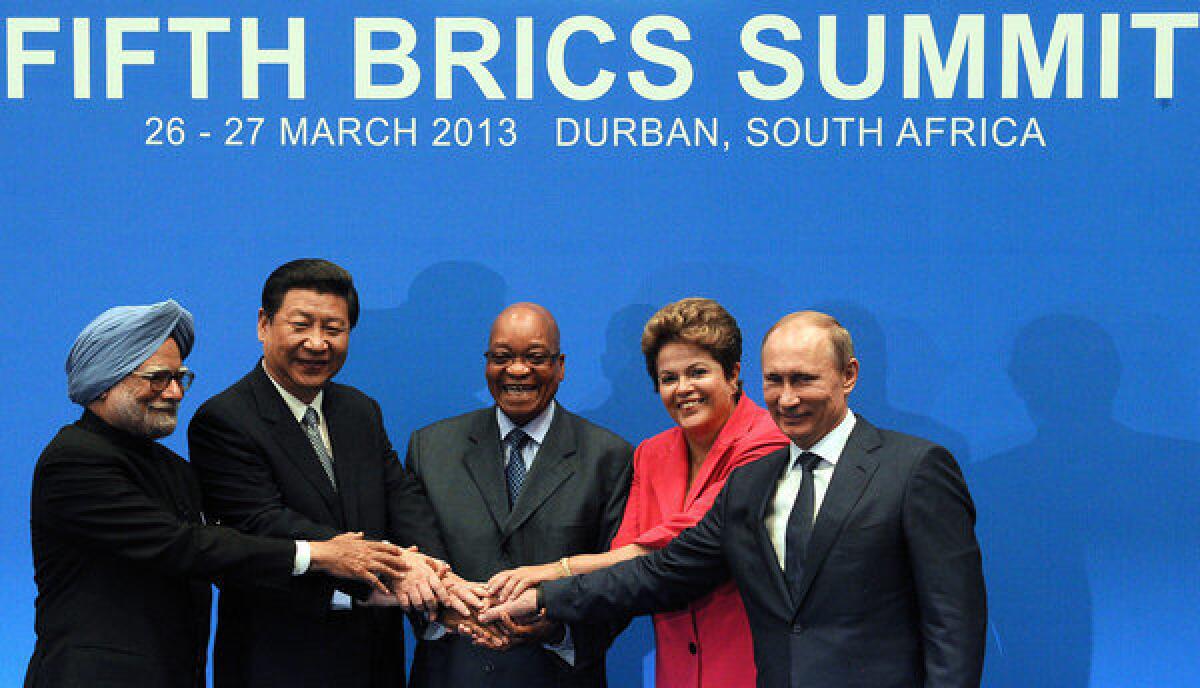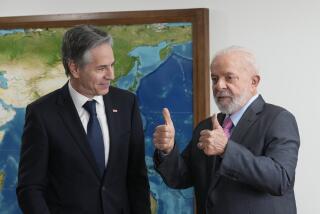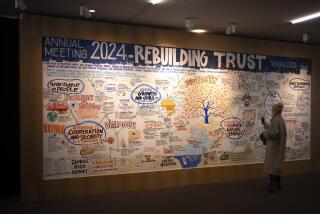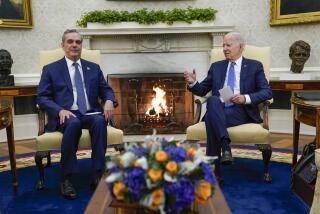BRICS in the development wall: Competing interests

Barely a decade old, the BRICS alliance forged to challenge Western-dominated global economic strategy may already have outlived its purpose.
The collaborative five-country bloc that came together to create a counterweight to the Group of 7 rich-nation club failed at its summit in South Africa this week to deliver on promises to pool resources and create a $50-billion development bank to foster growth in developing nations.
That countries as diverse as Brazil, Russia, India, China and South Africa couldn’t forge a common blueprint came as little surprise to those who follow the arcane world of multilateral development strategy. After all, what’s in it for China -- whose gross domestic product exceeds its four BRICS colleagues’ combined -- to build roads, railways and ports on other continents that would help emerging economies cut into its lion’s share of the international trade pie?
The BRICS states tried to put a good face on their inability to decide even where the development bank should be located, never mind who should contribute how much. They also left thorny details to be tackled at next year’s summit in Brazil, such as how jointly funded projects would be distributed among the five states and other developing nations.
“It’s done,” Finance Minister Pravin Gordhan of host South Africa proclaimed Wednesday, telling reporters at a concluding news conference that the alliance has thrown its weight behind the creation of a new financial institution. The bloc wants the new fund to counterbalance what it sees as Western bias driving decisions about what gets financed by the World Bank or the International Monetary Fund.
But Russian Finance Minister Anton Siluanov told reporters after the two-day summit that the group was unable to work out important details, such as a funding scheme and mission headquarters.
“These countries not only have very different economies, they have very different political systems and very different needs,” said Jack Goldstone, a professor of international relations at George Mason University.
Brazil and India are both strong democracies aiming to build infrastructure that will serve its private sector, while any investments by Russia and China, under more authoritarian rule, are going to be aimed at a mix of government and private interests, Goldstone said. South Africa, whose economy is dwarfed by its BRICS club colleagues’, is far needier than the others in the quest to create growth and jobs.
“The real issue in having a group of nations that cooperates is whether they converge on important key issues. That’s what keeps the European Union and the United States together,” Goldstone observed. “But organizations that lack this -- whether ASEAN [the Assn. of Southeast Asian Nations] or this artificial BRICS group -- run the risk of becoming a group of nations that are just pursuing their own interests.”
Or worse, according to professorial blogger Ian Scoones of Britain’s Institute of Development Studies, the lack of common purpose raises doubts about whether BRICS states claiming to support investment in spheres like African agriculture are “supportive allies and drivers of growth -- or land-grabbing new colonialists.”
BRICS -- a term coined by Goldman Sachs economist Jim O’Neill in 2001, before the alliance of newly industrialized countries had even come together -- emerged out of growing dismay with the world’s existing institutions, analysts say.
“They came together in opposition to the Western-dominated structures, but it never really crystallized,” said Robert Kahn, an economist and senior fellow with the Council on Foreign Relations. “What unites them is this shared opposition, but that makes it very hard to move forward with any kind of constructive implementation phase. They’ve reached their apex, because they’ve come to a point where their interests diverge.”
Much like the Nonaligned Movement that emerged during the Cold War to offer a political space independent of both the United States and the Soviet Union, the frustrations that gave rise to BRICS have been somewhat mitigated, Kahn said. The Group of 20 nations that began meeting five years ago includes a more representative array of leading and emerging economies -- including all five BRICS states -- than the G-7 alliance limited to wealthy democracies.
“I’m skeptical that they are going to get very far on this,” Kahn said of BRICS’ interest in enhancing the role of public-private partnerships to build infrastructure in the developing world. Though it’s a “trendy idea” in emerging markets these days, he said, projects such as a toll road that would repay private builders through the revenue generated by users may not create the cash necessary to convince investors to undertake them.
Goldstone, of George Mason’s School of Public Policy, agrees that the fate of the BRICS alliance is likely to hang on whether the states can find objectives that unite them.
“They all have interest in separating themselves from the post-World War II, Western-dominated institutions like NATO and the G-7,” he said. “But having a group of countries that are against something doesn’t mean they will all agree on a positive alternative.”
ALSO:
First day for Cyprus’ reopened banks passes calmly
British council could’ve dropped apostrophe, but didn’t
U.S. sends stealth bombers on practice run to South Korea
A foreign correspondent for 25 years, Carol J. Williams traveled to and reported from more than 80 countries in Europe, Asia, the Middle East and Latin America.
More to Read
Start your day right
Sign up for Essential California for news, features and recommendations from the L.A. Times and beyond in your inbox six days a week.
You may occasionally receive promotional content from the Los Angeles Times.







